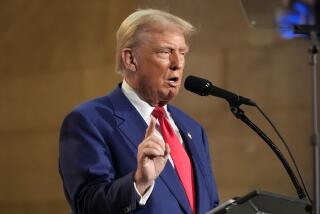Urges Key Federal Role : Gephardt Proposes Major Effort to Boost Economy
- Share via
CEDAR FALLS, Iowa — Seeking to back up his presidential campaign pledge to “make America first again,” Rep. Richard A. Gephardt on Friday called for the most ambitious government effort since the New Deal to pump new life into the nation’s economy.
In what campaign aides billed as a major policy speech to a symposium on international trade here at the University of Northern Iowa, the Missouri Democrat laid out a broad array of proposals for upgrading education, modernizing industry and improving U.S. competitiveness in world markets.
Education Aid
Some of the proposals are familiar and some are relatively novel, such as a plan for federal matching funds to help parents meet the costs of college education for their children, dubbed IDEA, for Individual Development and Education Account.
What most of them had in common, though, was that they included a key role, either direct or indirect, for the federal government.
Contrasting attitudes in the United States on government’s role with those of “other countries in the free world,” Gephardt said: “They have not been bound by stiff and stagnant ideologi1702043764and divide the business of their nations from the best interests of their people. . . . Yet in America, not since the Administration of F.D.R. has the federal government accepted responsibility, on the scale now needed, for making the economy run right.”
Mindful of public skepticism about the effectiveness of government, fostered by the conservative rhetoric of President Reagan, Gephardt added: “Government cannot deal with every problem. But if a President will lead, there is no problem too great for the American people to solve.”
Talk Called Milestone
Fewer than 200 students heard Gephardt, saving most of their applause for the end of the 50-minute speech, unusually long for a stump talk. But regardless of the size and reaction of the audience, Gephardt’s aides regarded the address as an important milestone in their candidate’s effort to upgrade his long-shot candidacy here in Iowa, where the Democratic delegate selection process begins next February, and where Gephardt has campaigned intensively.
Up to now, Gephardt has been known nationally chiefly for his hard-line approach to trade, particularly because of the so-called Gephardt amendment. It calls for tough measures against countries that have big trade advantages over the United States and is scheduled to come to a vote in the House next week.
Campaign manager William Carrick said this address on economic policy was intended to show that the 46-year-old congressman’s policy reach extends beyond the trade area.
Up to $20 Billion
Gephardt put no price tag in his speech on his proposals. But in an interview beforehand, he estimated they would cost $10 billion to $15 billion but no more than $20 billion. Nevertheless, he contended that he could reduce the budget deficit by cutting spendi1852252262the MX missile and other weapons systems and by imposing an oil import duty and perhaps an excise tax or an increase in the minimum tax on wealthy individuals.
In the field of federal, state and local relations, Gephardt called for Washington to exercise a strong leadership role and “not shuck off its responsibility under the guise of federalism--new, old or of any era.”
As part of strengthened federal backing for localities, Gephardt advocated what he called a “tax base” insurance program that he likened to federal flood insurance. The tax base protection would mean federal aid to cities that suffer economically because major industries have shut down or relocated.
Research Office
Another domestic policy proposal calls for a presidential office of research and development that would review federal spending on research and establish new priorities for financial support.
He also urged increasing investment in research to 3% of the gross national product. The current level is about 1.75%, said Gephardt’s press secretary, Don Foley.
In the area of foreign trade, Gephardt called for support of proposed federal legislation establishing a standard of workers’ rights for such things as collective bargaining. Under the proposal, failure by other nations to adhere to such standards would be considered an unfair trading practice that would be subject to sanctions.
Gephardt also got in a dig at Gary Hart, his chief rival for the Democratic nomination, who disagrees with Gephardt’s tough approach to trade. “Frankly, I’m disturbed that the front-runner in the Democratic Party echoes the President and offers nothing new on trade,” he said, although Hart offered a major proposal on trade before he left the Senate in 1986.
More to Read
Get the L.A. Times Politics newsletter
Deeply reported insights into legislation, politics and policy from Sacramento, Washington and beyond. In your inbox twice per week.
You may occasionally receive promotional content from the Los Angeles Times.










